Many people feel deeply hurt from the outcome of the Presidential election. Here’s a kinder, simpler explanation as to why.
This week, we saw a completely unexpected outcome in the Presidential election between Donald Trump and Hillary Clinton. As the punditry and chattering classes scramble to figure out why, I offer a simple, humble explanation about a nation divided and what it means.
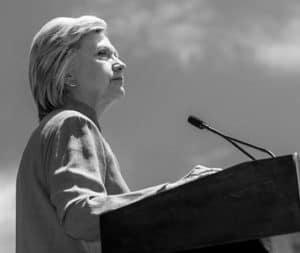 Many Clinton supporters are shell-shocked today. They cannot fathom why or how the rustbelt could vote for a misogynistic, racist, ignorant bigot. Many today feel deeply saddened, hurt, and-dare I say — heartbroken. They perceive Trump’s victory as a direct, personal attack on their very ability to live in this country, practice their religion, choose who they marry. For rape and sexual assault victims, the election results are akin to seeing your attacker in a position of power. For these folks, Trump’s election is personally offensive. And so, these voters feel morally and ethically betrayed. As a female and a person of color, I feel your hurt and your pain.
Many Clinton supporters are shell-shocked today. They cannot fathom why or how the rustbelt could vote for a misogynistic, racist, ignorant bigot. Many today feel deeply saddened, hurt, and-dare I say — heartbroken. They perceive Trump’s victory as a direct, personal attack on their very ability to live in this country, practice their religion, choose who they marry. For rape and sexual assault victims, the election results are akin to seeing your attacker in a position of power. For these folks, Trump’s election is personally offensive. And so, these voters feel morally and ethically betrayed. As a female and a person of color, I feel your hurt and your pain.
Yet, in some ways, this population tends to be, in a certain way, privileged. While much of the rhetoric around privilege talks about white privilege, those who live in urban areas or on the coasts experience a certain degree of economic privilege.
Contrast that with Trump voters. There is pain, hurt, and anguish on that end too, but these voters feel a different betrayal — that is, an economic betrayal.
It’s true that some Trump voters blame their economic problems on immigration and foreign trade, but not all Trump voters are racists, misogynists, or homophobes. It’s simply that their primary concern is not the loss of their personal rights, but the feeling of being left behind economically. If you talk to these folks, their great hope is that Trump will bring jobs and make their situation in life better and more manageable.
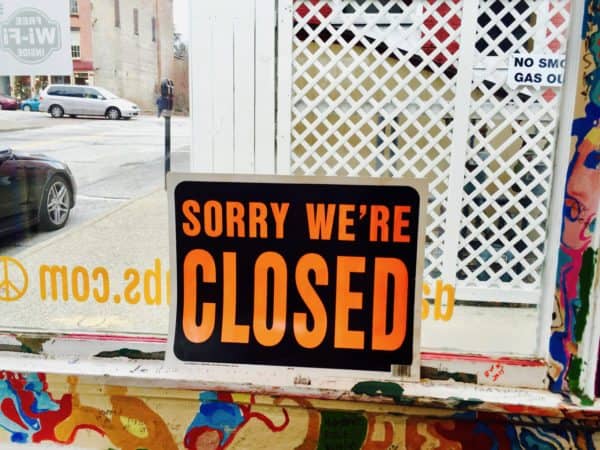
I didn’t understand how much the nation truly left these folks behind until fellow small business and crowdfunding advocate Kathleen Minogue brought something to my attention this yesterday morning . She explained that in the past few years, new business formation really only occurred in just 20 counties in the United States, according to a study by the Economic Innovation Group. Think about that for a second : Of all the counties in the U.S., new business formation was concentrated geographically in only 20 of them. Here’s a graphic that visualizes how new business formation has becoming increasingly concentrated over time for a different type of elite: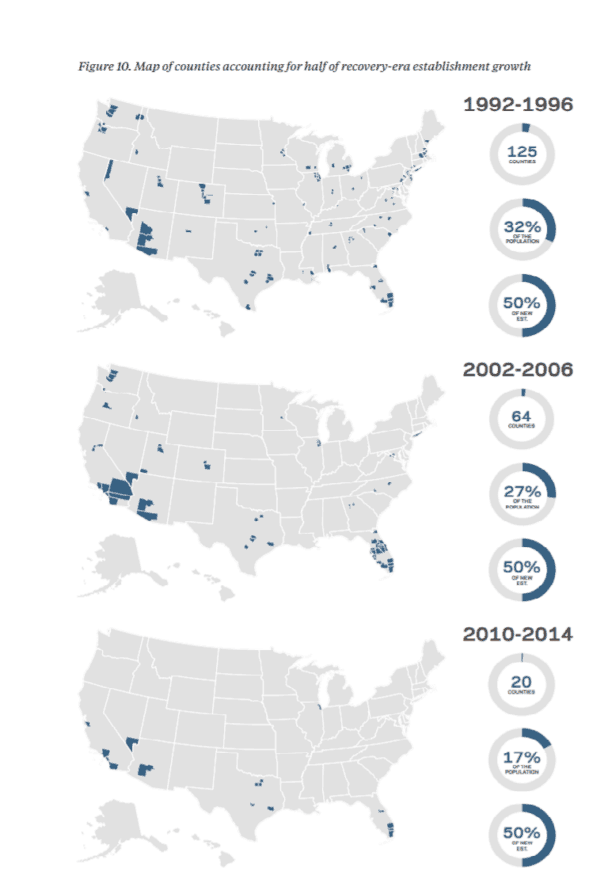
What does this mean? Only that the coastal and certain urban markets have performed well economically. The rest of the country has been left behind.
Consider for a moment that small businesses account for the majority of businesses and have accounted for 66% of net new jobs created since the 1970s. If new businesses are not being formed outside of coastal and urban areas, then new jobs aren’t being created outside of coastal and urban areas either. That is really hard.
So, Hillary supporters now feel that their human rights and sense of moral decency have been betrayed, and Trump supporters feel that they’ve been economically betrayed. But how can you vote against basic human decency? – one might ask.
It’s simple, really. When put in a challenging situation, people do what they must to survive. And to the economically disenfranchised Trump supporters who are struggling to find a job, pay their bills, and feed their families, their vote for Trump was a vote for survival. When you starve a lion, it’s not surprising when it ends up attacking the zookeeper. In this election, Trump voters were voting for upheaval of the establishment and economic change, because in their eyes, what else do they have to lose?
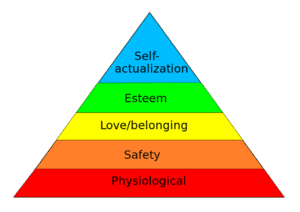 Maslow’s hierarchy of needs is a theory that explain human motivation. Our most basic needs — food, oxygen, water, shelter- are needed for physical survival, is at the first tier on top. Personal and financial security are at the second tier. These are the things is that motivate our primary behavior. Only upon securing those things can we move up a level.
Maslow’s hierarchy of needs is a theory that explain human motivation. Our most basic needs — food, oxygen, water, shelter- are needed for physical survival, is at the first tier on top. Personal and financial security are at the second tier. These are the things is that motivate our primary behavior. Only upon securing those things can we move up a level.
That hierarchy is:
- Biological and Physiological needs — air, food, drink, shelter, warmth, sex, sleep.
- Safety needs — protection from elements, security, order, law, stability, freedom from fear.
- Love and belongingness needs — friendship, intimacy, trust and acceptance, receiving and giving affection and love. Affiliating, being part of a group (family, friends, work).
- Esteem needs — achievement, mastery, independence, status, dominance, prestige, self-respect, respect from others.
- Self-Actualization needs — realizing personal potential, self-fulfillment, seeking personal growth and peak experiences.
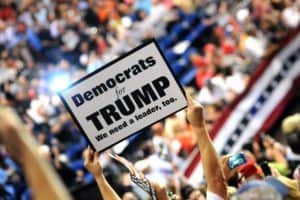 So, whereas Trump voters were voting for survival at the top two tiers, those whose rights are threatened by Trump were also voting from the lower tiers, depending on how their rights are threatened (i.e. deportation and being able to stay in the country is probably quite important), whereas those not threatened by marginalization may be voting from a higher tier of being. (That, and then there are just older folks who just straight up hate Hillary. I haven’t quite figured out how someone could hate her so much as to vote for the guy who takes other peoples’ rights away, but if someone else figures out a rational explanation, please let me know.)
So, whereas Trump voters were voting for survival at the top two tiers, those whose rights are threatened by Trump were also voting from the lower tiers, depending on how their rights are threatened (i.e. deportation and being able to stay in the country is probably quite important), whereas those not threatened by marginalization may be voting from a higher tier of being. (That, and then there are just older folks who just straight up hate Hillary. I haven’t quite figured out how someone could hate her so much as to vote for the guy who takes other peoples’ rights away, but if someone else figures out a rational explanation, please let me know.)
At an awards ceremony I attended this past weekend honoring Star Trek actor and civil rights activist George Takei, he recalled a time when he asked his father why his father had not challenged or run to the courthouse when federal agents came to haul his family away to a Japanese internment camp during World War Two.
“I could have,” his father explained, “but that would have meant leaving you and your mother. I chose instead to stay with and protect my family.”
When you are backed into a corner, folks understandably choose to protect themselves and their loved ones first.
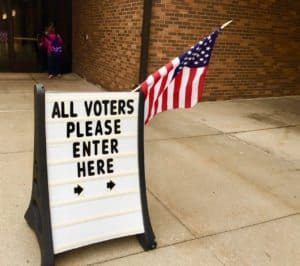 This challenge of creating opportunity for everyone is one of the reasons I have embraced crowdfunding and alternative finance. The vast disparity in economic equality presents our industry a unique challenge and opportunity—how can we help these communities? While still early in its evolution, financial technology may be the vehicle to address the disparity felt by flyover country.
This challenge of creating opportunity for everyone is one of the reasons I have embraced crowdfunding and alternative finance. The vast disparity in economic equality presents our industry a unique challenge and opportunity—how can we help these communities? While still early in its evolution, financial technology may be the vehicle to address the disparity felt by flyover country.
There’s a lot of hurt on both ends right now, for good reason on both sides. I’m not saying its right, or that it’s justified. It just…is.
But rather than pointing fingers and defriending those with different views, it may be beneficial to try and see things from another perspective. It’s easy to villainize, but far more difficult to sit down and try to understand. And to help out. There is always another side to the story.
 Amy Wan, Esq.CIPP/US, is a Senior Contributor to Crowdfund Insider. Amy is a Partner at Trowbridge Sidoti LLP (CrowdfundingLawyers.net) where she practices crowdfunding and syndication law. Formerly, she was General Counsel at Patch of Land, a real estate marketplace lending platform. While there, Amy pioneered the industry’s first payment dependent note that is secured pursuant to an indenture trustee and designed to be bankruptcy remote, and advised the company on its Series A funding round. In recognition her work at Patch, she was named as a Finalist for the Corporate Counsel of the Year Award 2015 by LA Business Journal. Amy also brings extensive experience in legal innovation and rethinking the delivery of legal services. She is the founder and co-organized of Legal Hackers LA, and was named one of ten women to watch in legal technology by the American Bar Association Journal in 2014.
Amy Wan, Esq.CIPP/US, is a Senior Contributor to Crowdfund Insider. Amy is a Partner at Trowbridge Sidoti LLP (CrowdfundingLawyers.net) where she practices crowdfunding and syndication law. Formerly, she was General Counsel at Patch of Land, a real estate marketplace lending platform. While there, Amy pioneered the industry’s first payment dependent note that is secured pursuant to an indenture trustee and designed to be bankruptcy remote, and advised the company on its Series A funding round. In recognition her work at Patch, she was named as a Finalist for the Corporate Counsel of the Year Award 2015 by LA Business Journal. Amy also brings extensive experience in legal innovation and rethinking the delivery of legal services. She is the founder and co-organized of Legal Hackers LA, and was named one of ten women to watch in legal technology by the American Bar Association Journal in 2014.


